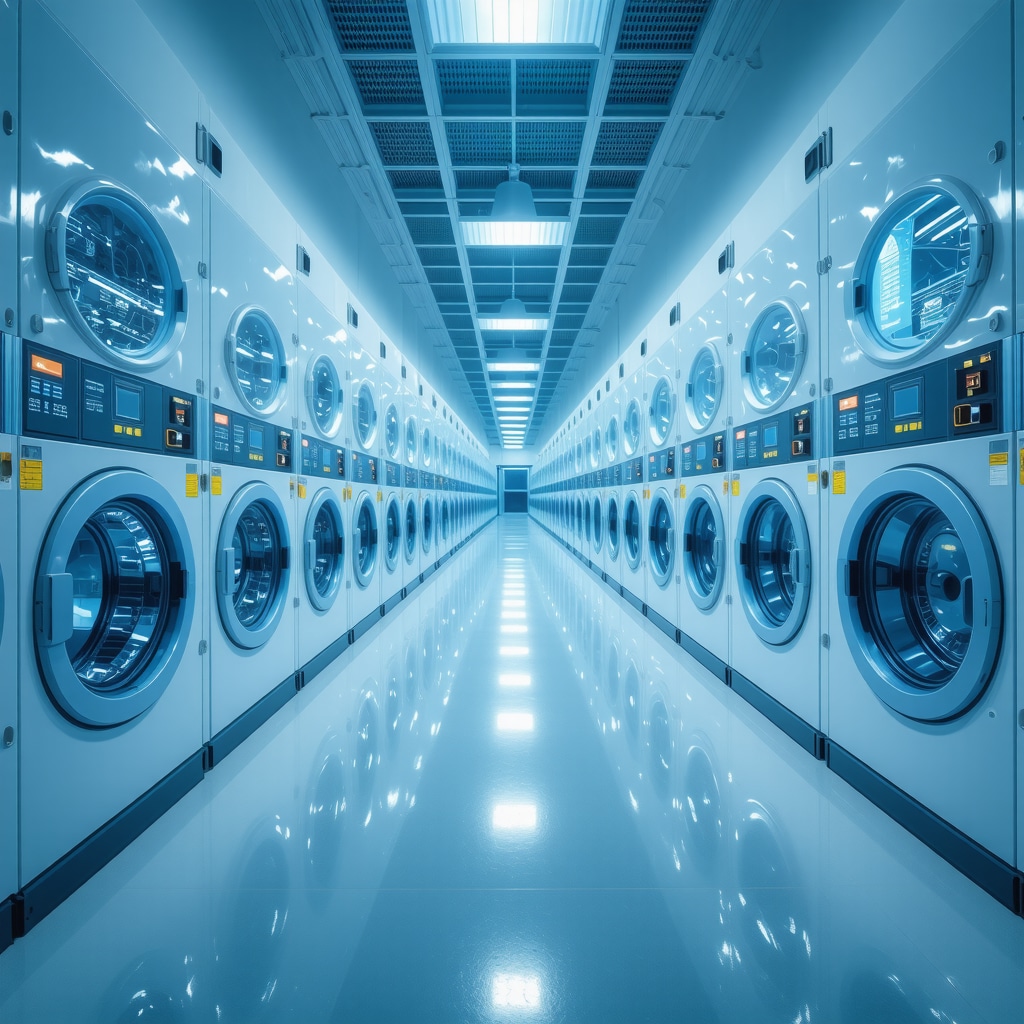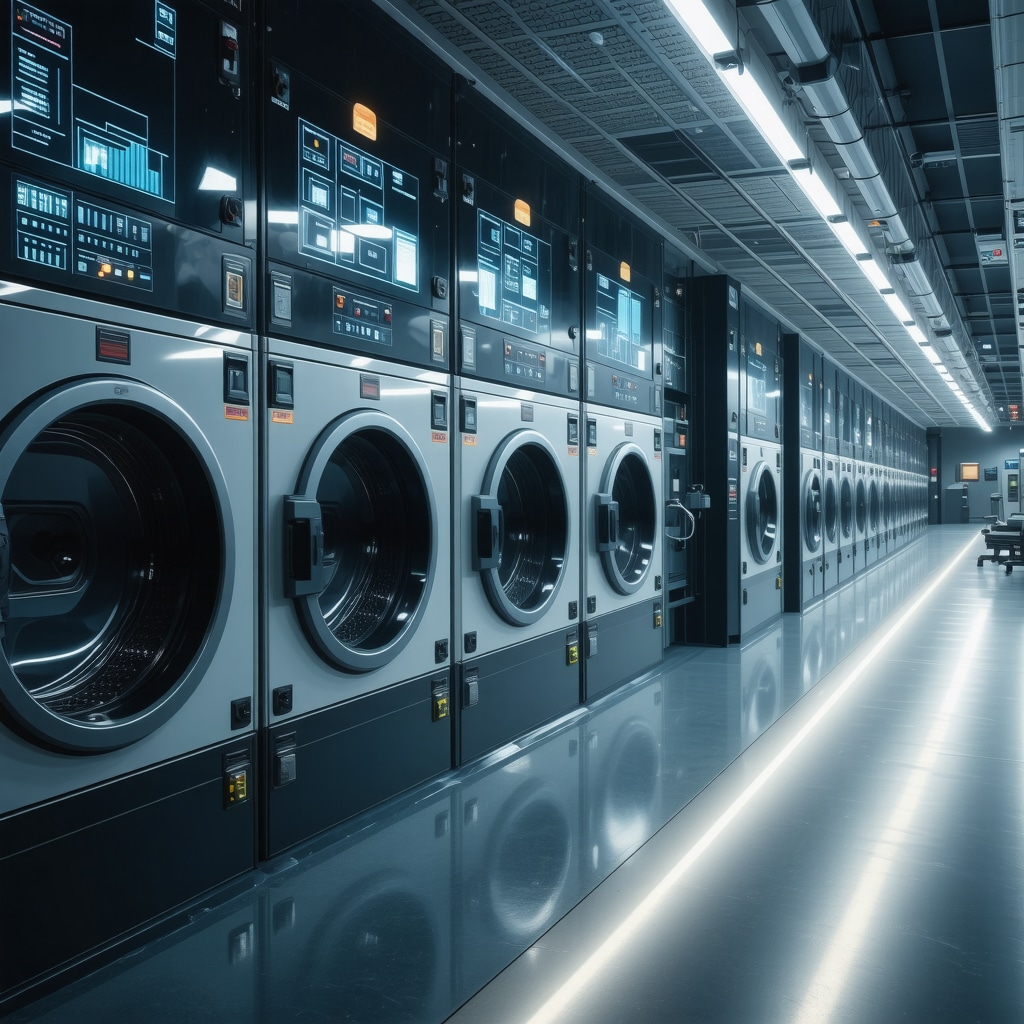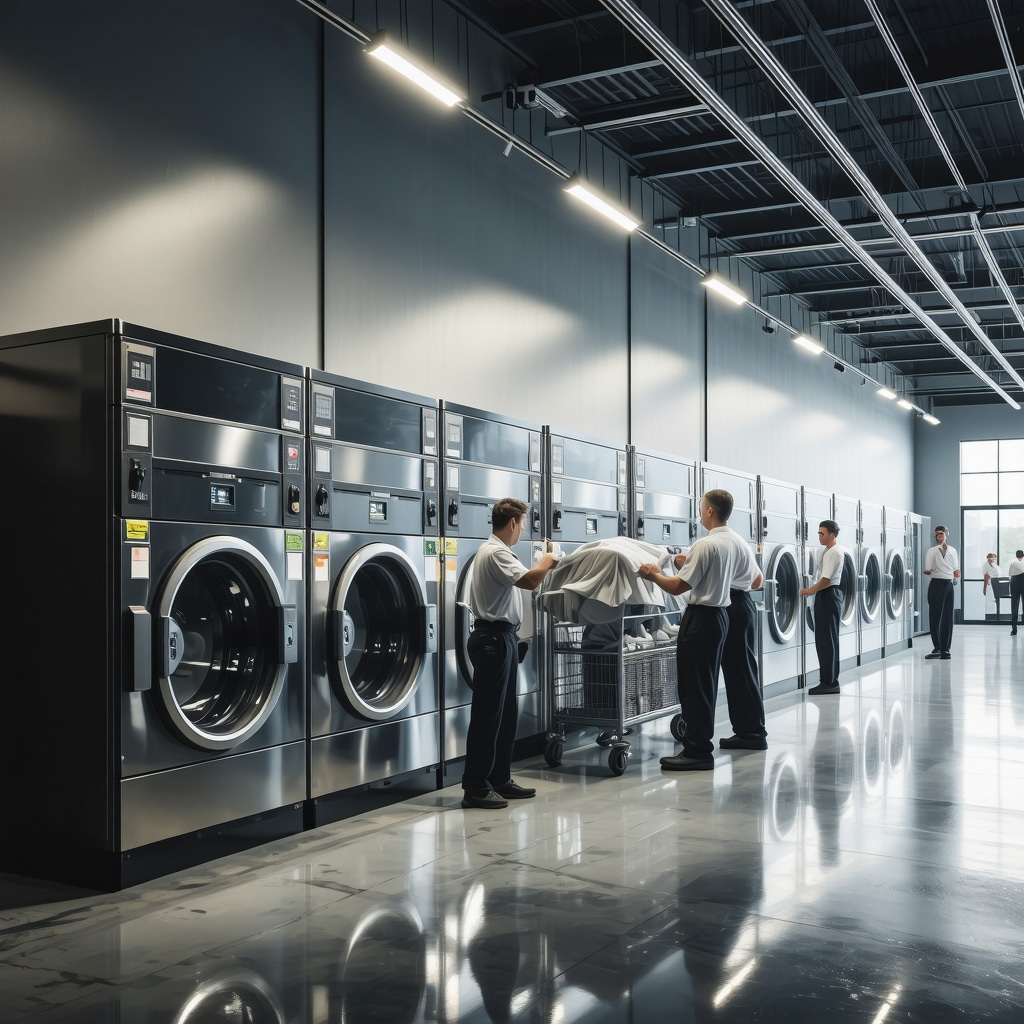Strategic Significance of Commercial Laundry Services in Tampa Bay’s Hospitality and Business Sectors
In Tampa Bay’s vibrant economy, the demand for **specialized commercial laundry services** has surged, driven by the hospitality industry, healthcare facilities, and large-scale enterprises. These services are not merely about cleanliness; they are about operational efficiency, compliance with sanitation standards, and maintaining brand reputation in a competitive market. Understanding the nuances of managing large hotel and business laundry loads reveals complex logistical challenges and innovative solutions that industry experts continuously refine.
Key Challenges in Managing Large-Scale Laundry Operations: An Expert Perspective
One core issue is balancing capacity and turnaround times without compromising quality. Hotels and corporate clients require rapid, reliable service, often with specific care instructions for delicate or high-value items. The scalability of laundry infrastructure, from industrial washing machines to eco-friendly detergents, directly impacts service excellence. Additionally, compliance with health and sanitation standards—especially in post-pandemic Tampa Bay—is non-negotiable, demanding rigorous protocols and staff training.
Technological Innovations Shaping Tampa Bay’s Commercial Laundry Ecosystem
Advanced automation and digital tracking systems are transforming laundry management. These innovations facilitate real-time inventory monitoring, optimize load balancing, and ensure precise application of cleaning agents—a vital feature for allergy-sensitive or eco-conscious clients. Moreover, integration with scheduling platforms offers seamless coordination, reducing downtime and enhancing service predictability. Industry leaders often cite the importance of adopting eco-friendly practices, such as water recycling and biodegradable detergents, aligning with Tampa Bay’s green initiatives (Tampa Bay Environmental Protection).
How Can Commercial Laundry Providers Improve Efficiency and Sustainability?
Optimizing large load handling involves strategic investments in high-capacity, energy-efficient machinery. Implementing **predictive maintenance** reduces machine downtime, safeguarding operational continuity. Equally critical is staff training on sustainable practices—using less water and energy while maintaining hygiene standards. Additionally, leveraging data analytics helps forecast demand patterns, allowing providers to scale resources dynamically and avoid waste. These approaches not only improve service quality but also bolster Tampa Bay’s commitment to environmental stewardship.
What Are the Complexities of Ensuring Sanitation and Safety in Large-Scale Laundry Operations?
Ensuring sanitation in managing large hotel loads involves meticulous adherence to protocols, including appropriate chemical use, proper handling of linen to prevent cross-contamination, and compliance with CDC guidelines. Staff training and rigorous quality checks are essential to meet these standards, especially when handling items from high-risk environments such as healthcare or quarantine facilities. The debate around eco-friendly yet effective disinfectants continues, highlighting the need for ongoing research and innovation in this field.
For those interested in mastering the intricacies of commercial laundry logistics or contributing professional insights, exploring industry-specific white papers and attending local trade seminars in Tampa Bay can be invaluable. These platforms foster knowledge exchange and keep providers at the forefront of evolving best practices.
To streamline your large laundry loads, consider consulting expert resources on bulk commercial laundry pickup in Tampa. Ensuring your operations are efficient, sustainable, and compliant elevates your service quality and sustains your competitive edge in Tampa Bay’s dynamic market.
Mastering Sanitation Protocols: The Key to Trust and Compliance in Large-Scale Laundry
Maintaining impeccable sanitation standards in Tampa Bay’s commercial laundry sector is more critical than ever, especially given the heightened awareness of health safety. Experts highlight that rigorous chemical management, meticulous linen handling, and adherence to CDC guidelines form the backbone of effective sanitation practices. Regular staff training sessions, coupled with advanced quality assurance protocols, ensure that every load meets the highest hygiene standards, reducing cross-contamination risks and fostering client confidence. For a comprehensive approach, industry professionals often refer to resources like the top-rated wash and fold laundry services, which exemplify best practices in sanitation and customer care.
Innovative Frameworks for Sustainability in Commercial Laundry
Transitioning towards sustainable operations involves adopting strategic frameworks that prioritize eco-friendly practices without compromising quality. The “Triple Bottom Line” approach—focusing on environmental, social, and economic impacts—guides providers in making balanced decisions. Implementing water recycling systems, biodegradable detergents, and energy-efficient machinery aligns with Tampa Bay’s green initiatives, such as those outlined by Tampa Bay Environmental Protection. Additionally, leveraging data analytics helps forecast demand and optimize resource usage, reducing waste and operational costs. Such innovative strategies not only enhance sustainability but also strengthen brand reputation among environmentally conscious clients.
What Are the Emerging Technologies That Will Revolutionize Large Laundry Operations in Tampa Bay?
From AI-driven automation to IoT-enabled maintenance systems, the future of commercial laundry is poised for transformative change. Advanced automation streamlines process workflows, minimizes human error, and enhances speed, while IoT sensors monitor equipment health in real-time, enabling predictive maintenance that prevents costly breakdowns. Incorporating these technologies can significantly boost efficiency and reduce environmental impact, aligning with Tampa Bay’s commitment to sustainable growth (eco-friendly laundry tips). Industry leaders are also exploring robotic sorting and cleaning systems that promise to redefine operational standards. Staying ahead in this evolving landscape requires continuous investment in technological innovation and staff training to harness these tools effectively.
If you’re interested in integrating cutting-edge solutions into your laundry operations or understanding the latest industry trends, exploring white papers and attending trade seminars in Tampa Bay can be invaluable. These platforms foster knowledge exchange and ensure your business remains competitive amidst rapid technological advancements.
To learn more about streamlining your large-scale laundry logistics, visit bulk commercial laundry pickup services in Tampa. Embracing innovation and best practices ensures your operations are not only efficient and compliant but also environmentally responsible, securing your position as a leader in Tampa Bay’s competitive market.
Leveraging Data Analytics for Precision in Laundry Workflow Management
In the competitive landscape of Tampa Bay’s commercial laundry industry, the integration of sophisticated data analytics has emerged as a game-changer. By harnessing big data, providers can gain granular insights into demand patterns, operational bottlenecks, and resource utilization. This enables a shift from reactive to proactive management, where predictive modeling informs inventory replenishment, staffing schedules, and maintenance cycles. For instance, real-time dashboards can alert managers to anomalies such as equipment inefficiencies or unexpected demand surges, allowing swift corrective actions that minimize downtime and maximize throughput.
The Role of IoT and AI in Revolutionizing Laundry Maintenance and Quality Assurance
Emerging technologies like the Internet of Things (IoT) and Artificial Intelligence (AI) are redefining maintenance protocols and quality control standards. IoT sensors embedded in washing machines and dryers continuously monitor operational parameters, transmitting data to cloud-based platforms. AI algorithms analyze this data to predict failures before they occur, facilitating predictive maintenance that drastically reduces repair costs and machine downtime. Moreover, AI-powered quality assurance systems employ computer vision to detect fabric defects or improper cleaning, ensuring consistent standards and reducing rework. These advancements not only streamline workflows but also foster a culture of continuous improvement rooted in data-driven decision-making.

Visualize an interconnected laundry facility with IoT sensors on industrial machines, data analytics dashboards, and AI-driven quality control systems in action—embodying the future of smart commercial laundry operations.
What Are the Critical Success Factors for Implementing Sustainable Innovations in Tampa Bay’s Laundry Sector?
Implementing eco-friendly practices at scale involves navigating technical, economic, and regulatory challenges. Successful integration hinges on strategic planning, including a comprehensive assessment of existing infrastructure and sustainability goals. Key success factors include securing investments for advanced machinery, establishing supplier partnerships for biodegradable detergents, and training staff in eco-conscious protocols. Additionally, aligning sustainability initiatives with local policies—such as Tampa Bay’s climate resilience plans—ensures compliance and garners community support. It’s also essential to measure environmental impact through transparent reporting, which can enhance brand reputation and attract environmentally conscious clients. According to the Tampa Bay Environmental Protection Department, these efforts contribute significantly to regional sustainability targets and industry leadership.
How Can Industry Leaders Foster Innovation Ecosystems to Sustain Competitive Edge?
Leadership in Tampa Bay’s commercial laundry sphere requires cultivating innovation ecosystems that encourage collaboration among technology providers, academic institutions, and industry stakeholders. This involves participating in regional innovation hubs, sponsoring pilot projects, and engaging in knowledge exchanges through trade seminars and white papers. Such collaborative platforms accelerate the adoption of breakthrough technologies and best practices, ensuring that providers remain ahead of regulatory shifts and market demands. Furthermore, fostering a culture that rewards experimentation and continuous learning nurtures resilience and adaptability—crucial traits for long-term success in an industry characterized by rapid technological evolution.
Unlocking the Power of Industry 4.0 in Tampa Bay’s Laundry Sector
As Tampa Bay positions itself at the forefront of innovation, the integration of Industry 4.0 principles into commercial laundry operations is transforming traditional workflows into highly intelligent, interconnected systems. By deploying advanced IoT sensors, cloud computing, and machine learning algorithms, providers can achieve unprecedented levels of efficiency, quality control, and sustainability. For example, real-time data streams from machinery enable predictive maintenance, drastically reducing downtime and operational costs, while automated inventory management ensures optimal resource utilization.
How Can Blockchain Enhance Transparency and Traceability in Large-Scale Laundry Supply Chains?
Blockchain technology presents a compelling solution for increasing transparency and traceability across complex laundry supply chains. By recording every transaction—from raw material procurement to final delivery—on a secure, immutable ledger, stakeholders can verify compliance with environmental standards, safety protocols, and quality benchmarks. This level of transparency not only boosts customer confidence but also simplifies regulatory audits. Industry experts suggest that implementing blockchain can be particularly advantageous in managing linen lifecycle data, ensuring accountability and fostering trust among high-profile clients.
What Are the Most Advanced Disinfection Technologies Ensuring Safety in High-Risk Environments?
Emerging disinfection technologies like ultraviolet-C (UV-C) sterilization, plasma-based disinfectants, and ozone treatments are setting new standards for hygiene in Tampa Bay’s commercial laundry operations. UV-C sterilization, in particular, offers rapid, chemical-free disinfection, effectively neutralizing pathogens on linens and uniforms. Plasma-based systems generate reactive species capable of deactivating microbes at a molecular level, making them ideal for healthcare and quarantine facility laundry. According to a detailed review published in the Journal of Healthcare Engineering, integrating these technologies with traditional washing processes can significantly reduce infection risks, ensuring compliance with the strictest health standards.
How Can Data-Driven Decision Making Elevate Sustainability Goals in Laundry Operations?
Harnessing big data analytics allows laundry providers to refine operational strategies, optimize resource consumption, and meet ambitious sustainability targets. By analyzing patterns in demand, weather conditions, and equipment performance, managers can forecast load volumes and adjust staffing accordingly. Additionally, data-driven insights facilitate the implementation of water and energy-saving initiatives, such as optimized cycle times and eco-friendly detergent usage. Leading organizations leverage dashboards and AI-driven recommendations to continually enhance their environmental impact, aligning with Tampa Bay’s regional sustainability commitments.
What Is the Future Outlook for Smart Laundry Facilities in Tampa Bay?
The future of smart laundry facilities hinges on seamless integration of automation, AI, and sustainable practices. These facilities will feature robotic sorting and cleaning systems, AI-powered quality inspections, and real-time analytics dashboards—creating an ecosystem of efficiency and eco-consciousness. Industry leaders emphasize that ongoing investment in emerging technologies and workforce upskilling will be vital to maintaining competitive advantage in Tampa Bay’s evolving market. To stay ahead, organizations must foster collaborations with technology innovators and participate in regional innovation hubs, ensuring they are prepared for the next wave of industry transformation.

Visualize a state-of-the-art smart laundry facility with IoT sensors, robotic arms, and data analytics interfaces, illustrating the future of automated, sustainable laundry operations.
Expert Insights & Advanced Considerations
Innovative Automation Technologies Are Transforming Operations
Adopting cutting-edge automation and IoT-enabled systems enhances efficiency, reduces manual errors, and promotes sustainability in large-scale laundry facilities. Industry leaders emphasize that integrating these technologies is essential for maintaining competitive advantage in Tampa Bay’s evolving market.
Strategic Emphasis on Sustainability and Regulatory Compliance
Implementing eco-friendly practices such as water recycling, biodegradable detergents, and energy-efficient machinery aligns with regional initiatives and improves brand reputation. Staying ahead requires continuous adaptation to new regulations and environmental standards.
Data Analytics as a Cornerstone for Operational Excellence
Leveraging big data enables precise demand forecasting, optimal resource allocation, and proactive maintenance. Data-driven decision-making fosters resilience and efficiency, critical for managing large laundry volumes effectively.
High-Quality Disinfection Technologies Are Critical for Safety
Technologies like UV-C sterilization, plasma disinfectants, and ozone treatments ensure compliance with health standards, especially in healthcare and quarantine environments, minimizing infection risks.
Blockchain for Supply Chain Transparency
Implementing blockchain enhances traceability, accountability, and compliance verification across the laundry supply chain, building trust with high-profile clients and regulatory bodies.
Curated Expert Resources
- International Fabricare Academy (IFA): Offers comprehensive training programs and industry standards updates for laundry professionals, vital for maintaining operational excellence.
- Environmental Protection Agency (EPA): Provides guidelines and certifications for sustainable practices, ensuring compliance with federal and regional environmental standards.
- Journal of Healthcare Engineering: Publishes research on advanced disinfection and sanitation technologies applicable to high-risk environments.
- Blockchain in Supply Chain Management: Industry white papers and case studies on blockchain applications enhance understanding of transparency and traceability solutions.
- Industry 4.0 White Papers: Detailed reports on integrating AI, IoT, and automation into laundry operations for future-proofing facilities.
Final Expert Perspective
Mastering the complexities of commercial laundry services in Tampa Bay requires embracing innovative technologies, sustainable practices, and rigorous safety standards. Continuous learning through authoritative resources and strategic implementation of Industry 4.0 principles will ensure your operations remain resilient, compliant, and competitive. For deep engagement, consider participating in regional industry seminars or collaborating with technology providers—these efforts will position your enterprise at the forefront of the evolving laundry landscape. To explore tailored solutions or share your insights, visit our contact page.


This post highlights the crucial role that technology and sustainability play in modern commercial laundry operations. From my experience working with hospitality clients in Tampa Bay, I’ve seen how integrating IoT sensors and AI-driven maintenance can drastically reduce downtime and improve cleaning consistency. The push towards eco-friendly practices, such as water recycling and biodegradable detergents, not only enhances environmental impact but also boosts brand reputation among eco-conscious customers. One challenge I’ve noticed, though, is balancing the upfront costs of advanced automation with long-term savings and sustainability goals. How have others managed to secure investment for these innovations without stretching budgets too thin? I believe that regional collaborations and government incentives could help accelerate adoption, but would love to hear more practical strategies from professionals in this space.
This article reinforces how vital advanced technology and sustainability are in managing large-scale laundry operations effectively, especially in Tampa Bay’s competitive market. From my experience working with local hotels, implementing IoT sensors and AI-driven maintenance has truly minimized downtime and improved overall service quality. I find the emphasis on eco-friendly practices particularly compelling, as water recycling and biodegradable detergents not only support regional environmental goals but also appeal to eco-conscious clients, enhancing reputation. One challenge that often arises, however, is balancing initial investment costs with the long-term savings from efficiency improvements. In your opinion, what specific strategies have proven successful for securing funding or incentives for adopting these innovations? Are there region-specific grants or partnerships that can ease the financial burden? It’s encouraging to see how industry leaders are embracing Industry 4.0; I believe continuous innovation paired with strategic investments is key to remaining ahead in Tampa Bay’s vibrant economic landscape.